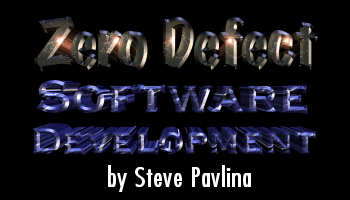11/10 - 11/12 @ Montréal, Canada
12/5 - 12/7 @ Shanghai, China
12/24 - 12/27
2/28 - 3/4 @ San Francisco, CA
More events...
2406 articles in the reference section.
Help us fight cancer!
Join SETI Team GDNet!

|
As an independent game developer, I will work from six months to a couple years to develop and release a new computer game. I can sell sequels or expansion packs, but I generally cannot sell upgrades as with other software. When I release a new game, I must make sure it is of very high quality because my users won't think to look for an upgrade. Because of the short lifespan of most computer games and their dependence on transient technology, my opportunities to improve a released product based on customer feedback are minimal. To deal with these issues, I gradually adopted a system of Quality Assurance (QA) practices that allowed me to significantly increase product quality while simultaneously reducing development time. Not to be taken as meaning "bug-free," Zero-Defect Software Development (ZDSD) is a practice of developing software that is maintained in the highest quality state throughout the entire development process. "Defects" are aspects of the evolving software that would not be suitable for the final product as-is. This broad definition includes bugs as well as unwanted deviations from the desired final outcome. Defects in the development of a computer game would include unpolished artwork, an unacceptably low frame rate on the target system, levels that aren't fun enough, or any number of unfinished features. |
|||||||||||
|
|
|||||||||||